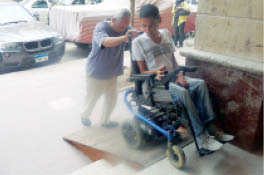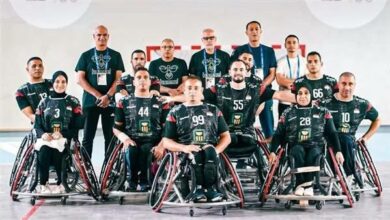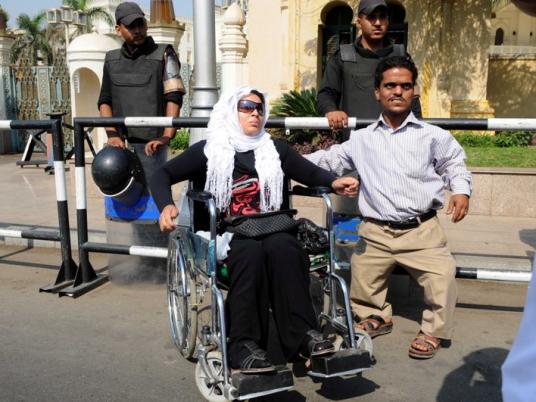
Hussein Helal is a popular 27-year-old man. As his building elevator lands on the ground floor, five men rush to the building entrance to prepare to help him begin his day.
To leave his house, a wooden ramp is installed on two levels of stairs to help Helal through his descent in his electric wheelchair. In front of his building on a busy street in Mohandiseen, a wide, nicely paved space allows him to maneuver the chair easily to his garage.
Helal was born with spinal muscular atrophy, a genetic condition that causes protein deficiency in the motor nerves, making the muscles weak and in turn affecting the respiratory system and bone and muscle composition.
He walked with difficulty until adolescence. As his weight increased, he needed a wheelchair.
He is not alone. About 3.5 percent of Egyptians have a disability, according to a 2002 report by the Japanese International Cooperation Agency and the World Bank, and many do not have the opportunities or funds that Helal has. According to the report, a comprehensive study was unavailable. It added that services in the country only cover about 10 percent of the disabled population — a fact which Helal is well aware of.
As he turns around, with his head facing up and the doorman pulling him down the ramp, two more men come in to ask him how he is doing. He gives each man special attention, asking about their well-being.
Then, Abu Youssef, his driver, comes over and walks beside Helal until they reach the car. Helal asks him how he is doing and whether he has had his breakfast.
Abu Youssef carries Helal into the car and seats him in the front seat. Helal is on his way to his small business — a takeout fava bean sandwich kitchen called Foool Tank.
Helal obtained his bachelor’s degree in digital management engineering from the German University in Cairo.
“I didn’t have much choice in universities because GUC was the only accessible university for me, with the wheelchair,” he says. However, even with the accessibility, Helal says movement was restricted.
Reaching the ground-floor kitchen of Foool Tank, the driver takes the wheelchair out.
However, there are cars parked with no spaces between them, so Helal has to move down the bumpy road until he finds an opening. He passes through only to reach a broken sidewalk with a small step down.
Two men in the road, who also rush to greet Helal, help Abu Youssef carry the heavy wheelchair across the step. Helal then maneuvers the chair toward a ramp he had installed, but the angle is too steep, which means someone needs to hold his wheelchair as he goes down.
Although there is some evidence that the ancient Egyptians were the first to use wheelchairs pushed by hand, Helal says, “There are no standards in Egypt for the disabled.”
“Handicapped bathrooms, for example — most do not have low sinks with long handles, and stalls are not big enough to maneuver in with the wheelchair.”
He also faces problems with ramps, which are sometimes available, but at wrong angles, making it hard for him or any wheelchair user in Egypt to use without the proper assistance. Without a private car, the public transportation system makes it nearly impossible for people in wheelchairs to move around. Buses and microbuses filled past their capacity have no room for wheelchairs at all.
A trip to any government building is usually extremely difficult for the disabled, with high staircases, no elevators, high windows and inaccessible gates, Helal says, recalling a recent trip to renew his ID.
As he waits for the kitchen manager to open his office for him, Helal goes from room to room to greet staff and make sure they are all comfortable. In his office, Helal talks about handing over Foool Tank’s responsibilities to his partner when he moves to Gouna to begin a second master’s degree, in urban planning.
Although this will be his first time living on his own, Helal loves to travel. He was recently in Cyprus with friends and talks of special beach chairs for people with physical disabilities on the beaches of Cyprus and other countries.
“My friends are my arms and legs, but we manage,” he says of his trips abroad.
In his own country, his use of recreational facilities is limited. Due to a lack of wheelchair facilities, Helal can only go to the movies if he wishes to sit in the front row, which he says hurts his neck because it is too close to the screen.
Social clubs such as the Gezira Club have only recently implemented measures to become more accessible, but its changing rooms are still not usable for people in wheelchairs.
While he travels often, sightseeing in his own country “is a disaster,” he says. There is no access in any of the tourist attractions around Egypt. The pyramids, Luxor and Aswan, the forts, and Muizz Street all have extensive obstacles and a lack of facilities, making it impossible for anyone in a wheelchair to enjoy them.
Poorly paved sidewalks and roads, however, did not stop him from joining the revolution on 28 January 2011. He took his electric wheelchair and moved in the middle of the road all the way to Tahrir Square.
For almost all of the 18 days, he says, he joined the protests. He believed it was his duty for his country.
Helal says that whenever he faced any difficulties, people would gather around and help him through it, without him having to ask. He stood his ground, and, in his wheelchair, joined with the masses to help bring change to the country.
To continue his day, Helal leaves the office, his daily errands taking him to Cairo University. The office he needs to go into has broken rubble in front of it, making it inaccessible to him in the wheelchair, so Abu Youssef parks on the side. Helal waits in the car until the person he needs to talk to comes out of his office to meet him.
He continues on the last errand of the day to Etisalat, hoping to change his telephone carrier. However, he does not get past the sidewalk, and an Etisalat representative has to come outside and meet Helal on the street because the stairs are inaccessible for people using wheelchairs.
This concludes his daily errands, and he returns home only to rest and go out again with his friends. Helal goes out every day and has managed to map out his destinations to only include places accessible to him. Unfortunately, that does not leave him with many choices.
However, his condition has not stopped him from trying his best to lead a normal life. His parents encouraged him to be independent and cultivate a healthy social life.
“I have my parents to thank for that, for reminding me that I may not be physically as strong as others, but I can outsmart many,” he says.
This piece was originally published in Egypt Independent's weekly print edition.




